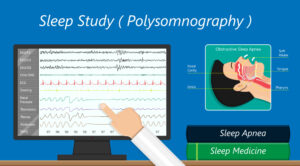Polysomnography
Polysomnography is a specialized medical test that requires careful preparation to ensure accurate and meaningful results. Here are some common prerequisites for a polysomnography study:
1. Referral and consultation: Typically, a polysomnography study requires a referral from a primary care physician or a sleep specialist. Before scheduling the test, a consultation with a sleep medicine specialist is often conducted to evaluate the need for the study and discuss the patient's sleep-related symptoms and medical history.
2. Nocturnal sleep pattern: To get reliable results, the patient should follow their usual sleep-wake schedule for a few days before the study. It helps to gather data representative of the patient's normal sleep patterns.

3. Medications: Inform the sleep specialist about any medications you are taking, including prescription drugs, over-the-counter medications, and supplements. Some medications can interfere with sleep or affect the test results, so the sleep specialist may advise adjusting or temporarily stopping certain medications before the study.
4. Avoid stimulants: Caffeine, nicotine, and other stimulants can disrupt sleep patterns. Patients are usually instructed to avoid consuming these substances on the day of the study.
5. Alcohol and sedatives: Alcohol and sedatives can affect sleep architecture and may interfere with the study's accuracy. Patients may be asked to refrain from alcohol and certain sedative medications for a specific period before the test.
6. Pre-study instructions: The sleep center will provide specific instructions regarding what to bring, what to wear, and what to eat or avoid before the study. Comfortable sleepwear is typically recommended.
7. Personal information: Be prepared to provide personal information, medical history, and details about sleep-related symptoms to the sleep center staff during the initial consultation.
8. Consent: Patients will need to sign a consent form before undergoing polysomnography, acknowledging their understanding of the procedure and its potential risks and benefits.
It's essential to follow the sleep center's instructions carefully to ensure a successful polysomnography study and accurate diagnosis of any sleep disorders. If you have any questions or concerns about the test or its prerequisites, don't hesitate to discuss them with the sleep specialist or the sleep center staff.
The key components measured during polysomnography include:
1. Electroencephalogram (EEG): Monitors brain activity to identify different sleep stages and any abnormalities in brain wave patterns.
2. Electrooculogram (EOG): Measures eye movements, which help in identifying the rapid eye movement (REM) sleep stage.
3. Electromyogram (EMG): Records muscle activity, which helps in detecting muscle tone changes during sleep, especially in REM sleep.
4. Electrocardiogram (ECG or EKG): Monitors heart rate and rhythm during sleep.
5. Respiratory parameters: Various sensors are used to measure airflow, respiratory effort, and blood oxygen levels, which can reveal breathing disturbances such as sleep apnea.
6. Other parameters: Additional measurements like snoring, body position, and leg movements may also be recorded during the study.
Polysomnography is typically performed in a sleep laboratory or a sleep center under the supervision of trained technicians. The data collected during the study is later analyzed by sleep specialists to diagnose sleep disorders, such as sleep apnea, narcolepsy, insomnia, restless legs syndrome, and others. Based on the results, appropriate treatment options can be recommended to improve the quality of sleep and overall well-being.

